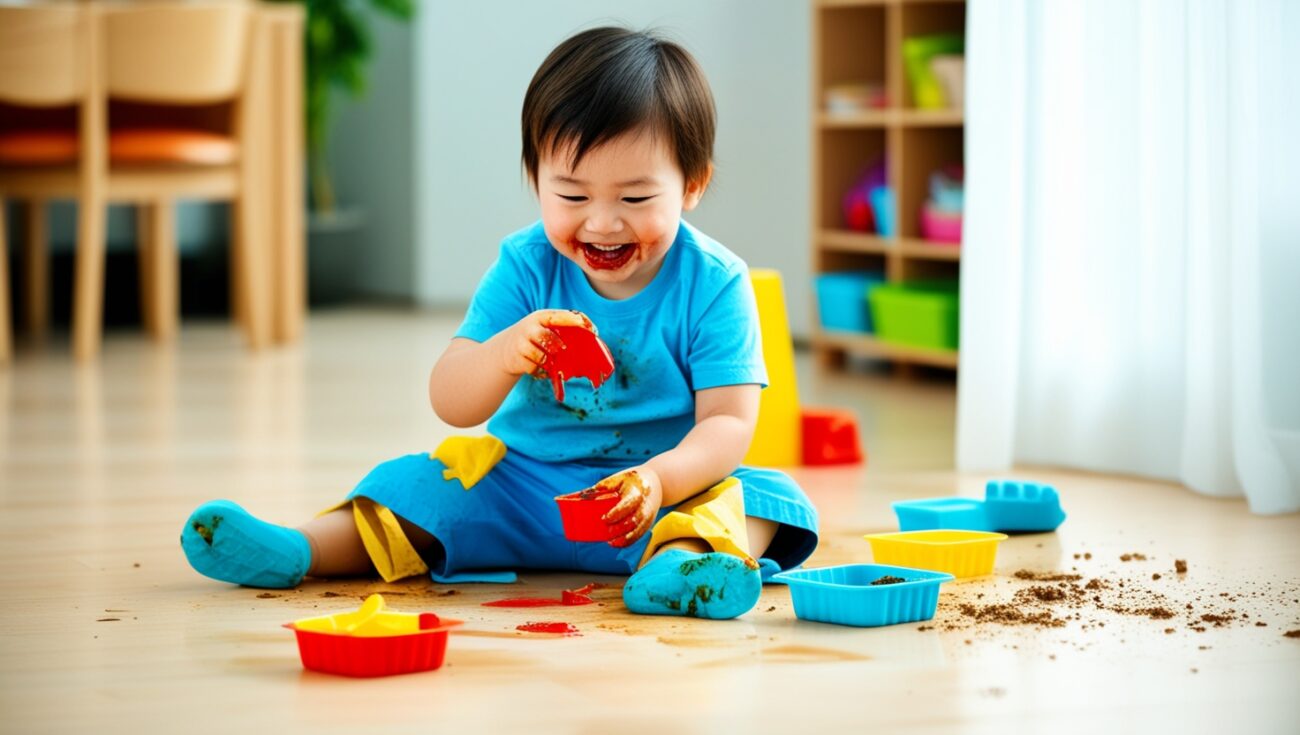Posts by sindbad
19
Apr
How to Handle Mischievous Children with Positive Parenting
Is your child constantly getting into trouble, testing boundaries, or acting out in mischievous ways?It can be challenging to manage children who are always pushing limits, but it’s important to remember: mischievous behavior is often a sign of curiosity, energy, or a need for attention.
In this article, we’ll share effective strategies for dealing with mischievous children in a positive and constructive way. By understanding the root causes behind their behavior and responding with patience and consistency, you can guide your child toward better choices and build a stronger, healthier relationship.
1. Understand the Root Cause of Mischievous Behavior
Before reacting with frustration, it’s crucial to understand why your child is behaving mischievously. Often, there’s a deeper reason behind their actions:
Curiosity and Exploration:Children are naturally curious. Mischievous behavior can simply be their way of exploring their surroundings without...
19
Apr
How to Build Your Child’s Self-Esteem
Self-esteem is crucial for a child's emotional well-being and success in life. It shapes how they view themselves, how they interact with others, and how they face challenges. As a parent, your role is essential in helping your child develop strong, healthy self-worth.In this article, we’ll explore actionable tips to nurture your child’s self-esteem, empowering them to feel confident, valued, and capable. With the right support, your child can grow up with the confidence to pursue their dreams and overcome life’s obstacles.
1. Show Unconditional Love and Acceptance
One of the most important foundations for building your child's self-esteem is demonstrating unconditional love and acceptance.
Unconditional Love:Children need to feel that they are loved for who they are, not just for their achievements. Express your love often, regardless of their successes or failures. Phrases like, "I love you...
18
Apr
How to Teach Kids Accountability for Their Actions
Teaching kids’ accountability is one of the most important lessons parents can offer. Accountability helps children develop responsibility, empathy, problem-solving skills, and strong character. If your child often avoids taking responsibility, blames others, or struggles to understand the consequences of their actions, don't worry — you're not alone. In this article, we'll explore simple and effective strategies for teaching kids to be more accountable, helping them grow into responsible, confident individuals.
📹 Don't forget to watch the full video on this topic!
https://youtu.be/D_q15eoaKfA
1. Set Clear Expectations and Boundaries
Before children can be held accountable, they must first understand what is expected of them. Setting clear rules and boundaries lays the foundation for responsibility.
Establish Clear Rules: Be specific about expectations, like “Complete your homework before screen time” or “Clean up toys after playing.”
Discuss Consequences: Explain ahead of time what...
18
Apr
How to Deal with Hyperactive Children: Parenting Tips
Is your child constantly moving, unable to sit still, or struggling to focus? Parenting a hyperactive child can be both challenging and exhausting. However, with the right techniques, you can help your child manage their energy, build focus, and develop healthy self-regulation skills.
In this article, we’ll explore practical strategies for dealing with hyperactive children, based on expert advice and real-world parenting tips. Whether you're wondering how to help a hyperactive child at home, how to manage hyperactivity naturally, or how to calm an overactive child, you’ll find actionable solutions here.
👉 Watch the full video here for detailed insights!
https://youtu.be/-O1Md-uZiE4
1. Understand the Causes of Hyperactivity
Hyperactivity in children can stem from a variety of causes, including developmental stages, temperament, or underlying conditions like ADHD.
Developmental Energy: Young children, especially under the age of five, are naturally energetic. Their hyperactivity...
22
Feb
How to Manage Nutrition During Teething
Teething can be a challenging phase for both babies and parents. The discomfort from sore gums can affect your baby’s eating habits, making it important to focus on the right nutrition to ensure they continue to grow and stay healthy. In this article, we will explore some essential tips for managing nutrition during this time.
1. Offer Soft, Cool Foods
Teething babies often prefer softer, cooler foods that are gentle on their gums. Cold foods can help numb the discomfort, making them more appealing and easier to consume.
- Cold Pureed Fruits: Pureed fruits like apples, pears, or peaches chilled in the fridge.
- Chilled Yogurt: Unsweetened yogurt can soothe sore gums while offering protein and calcium.
- Frozen Veggies: Soft, steamed vegetables like carrots or peas frozen into small chunks.
- Chilled Teething Rings: A safe option for babies to...
21
Feb
How Nutrition Impacts Children’s Mental Growth
Proper nutrition plays a vital role in a child's mental development. The brain, like the rest of the body, requires a variety of nutrients to function optimally, develop effectively, and support cognitive functions such as memory, concentration, and problem-solving skills. A well-balanced diet can significantly enhance learning abilities, emotional regulation, and overall brain health. In this article, we will explore key ways in which nutrition directly impacts your child's mental growth.
1. Essential Fatty Acids Support Brain Development
The brain is made up of about 60% fat, and it needs essential fatty acids, particularly omega-3s, to support its growth and cognitive functions. These healthy fats play a critical role in the formation of brain cell membranes, nerve function, and neurotransmitter production, all of which are necessary for learning, memory, and emotional regulation.
- Fish: Fatty fish like salmon,...
20
Feb
How to Prepare Quick and Nutritious Meals for Kids
Preparing quick and nutritious meals for children is a challenge for many parents, especially when trying to balance busy schedules and the importance of providing healthy food. However, with a little planning and creativity, you can prepare meals that are both nutritious and easy to make. Properly balanced meals are crucial for providing the vitamins, minerals, protein, and fiber that support your child’s growth, immunity, and overall health. In this article, we will explore five strategies to help you prepare quick and healthy meals for your kids.
1. Embrace One-Pot or One-Pan Meals
One-pot or one-pan meals are a fantastic time-saver for busy families. These meals combine vegetables, proteins, and whole grains, offering a balanced meal in one pan, while reducing both cooking time and cleanup.
Stir-Fries: Stir-fries are quick to prepare and can be packed with colorful vegetables...
19
Feb
How to Make Kids Love Eating Vegetables
Getting kids to eat vegetables can be a challenge, but with some creativity and the right strategies, you can encourage your child to enjoy these nutritious foods. Vegetables are full of vitamins, minerals, and fiber that are essential for growth, immunity, and overall health. In this article, we will explore five tips to help make vegetables more appealing to your child.
1. Make Vegetables Fun and Visually Appealing
Children are often more likely to try foods that look fun and interesting. By presenting vegetables in an exciting and colorful way, you can capture their attention and make mealtime more enjoyable.
Veggie Faces: Use different colored vegetables to create fun faces on the plate. For example, use cucumbers for eyes, carrots for noses, and cherry tomatoes for mouths. This makes vegetables feel like a playful activity.
Colorful Plates: Serve a variety of...
18
Feb
How to Maintain Healthy Nutrition in Holidays
The school holidays are a time for relaxation, fun, and adventure, but they can also be a challenge when it comes to maintaining healthy nutrition. During these breaks, children are often exposed to an abundance of unhealthy snacks, fast food, and a lack of structure in their eating habits. However, it’s possible to ensure they maintain a healthy diet even during the holidays with a little planning and some healthy food choices. In this article, we will explore five tips to help maintain healthy nutrition for your child during their time off.
1. Plan Ahead and Prepare Healthy Meals in Advance
Planning and preparing meals in advance is one of the best ways to ensure your child gets the proper nutrition during the holidays. When schedules are more relaxed, it’s easy to fall into the trap of quick,...
17
Feb
How to Balance Nutrients Effectively in Your Child’s Diet
Achieving the right balance of nutrients in your child's diet is essential for supporting their growth, energy levels, immune function, and mental development. Nutrients such as proteins, fats, carbohydrates, vitamins, and minerals all work together to ensure your child thrives. A balanced diet isn't just about providing a variety of foods—it's about ensuring that each meal includes the right proportions of the essential nutrients their body needs. In this article, we will explore five tips to help you balance nutrients effectively in your child’s diet and set them up for a healthy future.
1. Ensure a Proper Mix of Macronutrients in Each Meal
Macronutrients are the building blocks of a healthy diet. Your child's body needs them in larger amounts for energy, growth, and proper functioning. These include proteins, fats, and carbohydrates. The key is to make sure...




















